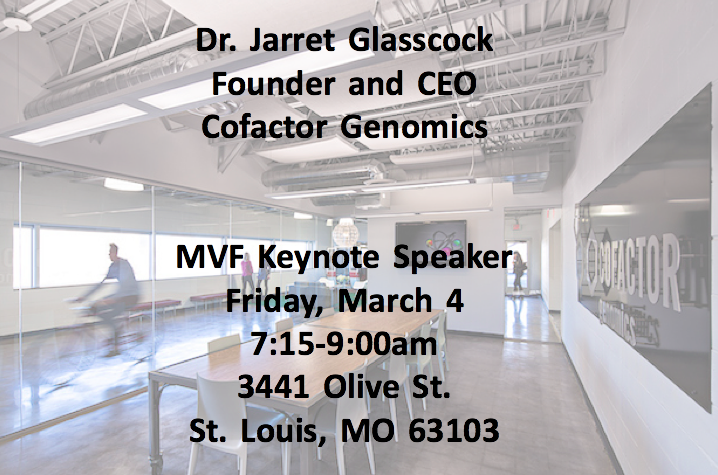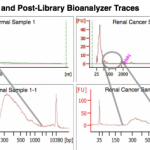
As part of the MVF speaker series I’m giving a talk on Friday at the Moto Museum (a great venue) discussing the building of Cofactor Genomics. In preparation for that I’ve been thinking about the challenges and benefits we have experienced being located in St. Louis. Here is a teaser below. Come out and attend if you want to see the whole story.
In 2008, when the Human Genome Project was finished and Cofactor was founded, there was a choice between starting the business in St. Louis or in another city. I chose to stay in St. Louis. In the eight years after founding, Cofactor has moved to three different locations, each time choosing to stay in St. Louis. We spent the summer living in Silicon Valley last year as part of Y Combinator, we opened a West Coast Office after acquiring an SF-based company, and I split my time between San Francisco, Boston, and Saint Louis. In building a company, acquiring customers, and interviewing employees all over the United States, it is clear to me that each locale has it’s own set of unique challenges and benefits.
After all these years, Cofactor is still in St. Louis. Here are some of my experiences from building a business in STL.
Some Challenges I Experienced:
Funding. The funding environment in St Louis is sparse. We are proud of the growth, but it is not mature. We have some way to go. There is a surplus of early angel (smaller investments) and a small number of later stage (large investments). But that middle stage, when you’ve had some success and need to reach the next level for that you are going to have look outside St. Louis. Having funding that is focused on middle stage companies is a sign of a healthy, successful investment pool. I spent two years not able to find a good fit with investors in STL before having to turn my focus towards the West Coast.
Recruitment. St. Louis is fortunate to have a large bio talent pool, but is still held back by having a smaller tech pool. Everyone is aware that STL is a hub of agriculture biotechnology. The problem is once your hiring needs stray outside of the Monsanto and Danforth expats, the pickings become slim. That is a challenge we constantly have to overcome. After a year of looking locally, we acquired a biomarker company from San Francisco in order to accomplish our goal of obtaining world-class talent in biomarker design. My tech CEO counterparts have expressed an even greater struggle in finding and recruiting top talent in the St. Louis Area.
Some Benefits I Experienced:
Talk less, do more. Founders in SF are told to “fake it until you make it”. That has its own benefits and challenges, but it has resulted in a culture that does not always look directly towards results, it has a culture that looks towards potential. The environment in St. Louis is focused on practical application of ideas; it is a more humble talent pool. I’ve run into this while interviewing people and when I ask their experience level in certain areas, I have to keep a running point count in my head and discount the people from the coast by -3 and increase those from the midwest by +3.
Commitment. There is a level of commitment from employees to see things through that is unique to St. Louis. Employees view their position in a company as long term, not as a temporary stepping stone. High employee turnover in the biotech field in other cities is common and accepted. This aspect affects culture, and the result for us in St. Louis is a closer team that is building a company for the long term and not simply for short term gain or to enhance their resume. As a CEO, this facilitates an environment that allows me to create long term strategies.
St. Louis is not the same as SF. It is not a cheaper version of something else. It is different. Just like building a company in New York, Seattle, or Boston is not the same. Each has its own unique challenges and benefits.




